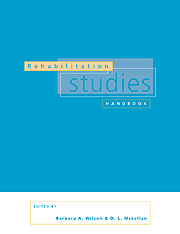Book contents
- Frontmatter
- Contents
- List of contributors
- 1 Introduction to rehabilitation
- 2 Disabled people in society
- 3 Disability equality training
- 4 Towards a therapeutic alliance model of rehabilitation
- 5 Rehabilitation education: a learner-centred approach
- 6 Work, occupation and disability
- 7 Management in rehabilitation
- 8 Research and evaluation in rehabilitation
- 9 Statistical methods
- 10 Social policy, disability and rehabilitation
- 11 Principles of the acquisition of sensorimotor skills
- 12 Management of acquired cognitive disorders
- 13 Challenging behaviour: helping people with severe brain damage
- 14 Pain
- 15 The multiply handicapped child
- 16 The transition to adult life
- 17 Factors specific to disabled elderly people
- Index
14 - Pain
Published online by Cambridge University Press: 06 November 2009
- Frontmatter
- Contents
- List of contributors
- 1 Introduction to rehabilitation
- 2 Disabled people in society
- 3 Disability equality training
- 4 Towards a therapeutic alliance model of rehabilitation
- 5 Rehabilitation education: a learner-centred approach
- 6 Work, occupation and disability
- 7 Management in rehabilitation
- 8 Research and evaluation in rehabilitation
- 9 Statistical methods
- 10 Social policy, disability and rehabilitation
- 11 Principles of the acquisition of sensorimotor skills
- 12 Management of acquired cognitive disorders
- 13 Challenging behaviour: helping people with severe brain damage
- 14 Pain
- 15 The multiply handicapped child
- 16 The transition to adult life
- 17 Factors specific to disabled elderly people
- Index
Summary
The nature of pain
Pain is an important issue for the rehabilitation practitioner, not only because it is so common among patients but because it has far-reaching effects on a variety of functions crucial to the rehabilitation process. Pain can affect emotional life, cognition, the level and pattern of activity, and relationships. It may be difficult or impossible for the patient in pain to attend to and remember instructions; irritability and depression associated with pain may affect motivation and cooperation. The relief of pain often dominates all other concerns. These difficulties arise not from neurosis on the part of the patient, but from the complex nature of pain itself: it is an unpleasant, urgent sensation that characteristically dominates one's thoughts. It is a primary drive like hunger and thirst, and at its root is the urge for survival.
The subjective experience of pain, however, is subject to wide individual variations. You and I both know what pain is, but I do not know your pain, and you cannot know mine. We may both use the same words to describe it, but may mean different things. Both the perception of pain, and the way it is reported or demonstrated by the sufferer, are moderated by many interweaving factors : ‘a complex web of subjective, behavioural, physiological and pathological phenomena’ as Steptoe & Pearce (1983) have written. Lewith & Kenyon (1984) have also commented on the fact that there are still many painful diseases whose pathology is poorly understood, and many clinically effective therapies whose physiology and pharmacology remain elusive.
- Type
- Chapter
- Information
- Rehabilitation Studies Handbook , pp. 289 - 314Publisher: Cambridge University PressPrint publication year: 1997
- 9
- Cited by



